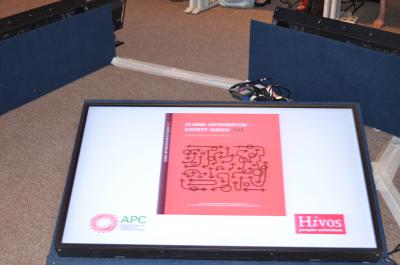By Leila Nachawati Rego Publisher: APCNews Joao Pessoa,
Published onPage last updated on

How does the politics of sex and sexual rights activism take place online? How are generally accepted sexual identities, as well as marginalised sexualities, expressed, regulated and moralised on the internet? And how does this relate to the threats of surveillance, censorship and online violence? These are some of the questions addressed by the latest edition of the Global Information Society Watch (GISWatch) report, launched at the Internet Governance Forum (IGF) in Joao Pessoa, Brasil on 12 November.
Launching at the IGF
“GISWatch emerged in the context of the World Summit of the Information Society,” explained APC’s Executive Director Anriette Esterhuysen at the GISWatch launch at the IGF venue where APC was participating in a number of workshops and side events to promote dialogue around internet rights, public access and digital privacy. “The project started in 2007, when we published our first report focusing on participation at WSIS, and the number of countries covered increases every year. Now there are 57,” she noted, before introducing the GISWatch project team and some of the authors who had gathered at the launch.
With sexual rights and the internet as the main theme, the issues addressed by the 2015 country reports range from the challenges and possibilities that the internet offers lesbian, gay, bisexual, transgender and intersex (LBGTI) communities, the active role of religious, cultural and patriarchal establishments in suppressing sexual rights, including same-sex marriage, to the rights of sex workers, violence against women online, and sex education in schools. Each country report includes a list of action steps for future advocacy.

Eight thematic reports included in the publication introduce the theme from different perspectives, including the global policy landscape for sexual rights and the internet, the privatisation of spaces for free expression and engagement, the need to create a feminist internet, how to think about children and their vulnerabilities online, and consent and pornography online.
“The internet is critical to discussing taboo issues like sexuality and it has been a challenge to find how to frame this at an institutional level, so we are very happy that these reports are out,” Nadine Moawad, from APC’s Women’s Rights Programme, said before explaining how APC’s journey on sexual rights issues started with the EROTICS project, an exploratory research project into sexuality and the internet.
What is GISWatch?
GISWatch is a collaborative community committed to building an open, inclusive and sustainable information society. The GISWatch reports are a series of yearly reports covering the state of the information society from the perspectives of civil society; but GISWatch is not only a publication, it is a process. The long-term goal of the project is to build policy analysis skills and “habits” into the work of civil society organisations that work in the areas of ICT for development, democracy and social justice.
Why a sexual rights and the internet edition?
The timing of this publication is critical: many across the globe are denied their sexual rights, some facing direct persecution for their sexuality (in several countries, homosexuality is a crime). While these reports seem to indicate that the internet does help in the expression and defence of sexual rights, they also show that in some contexts this potential is under threat – whether through the active use of the internet by conservative and reactionary groups, or through threats of harassment and violence. The reports suggest that a radical revisiting of policy, legislation and practice is needed in many contexts to ensure that the possibilities of the internet for guaranteeing sexual rights are realised all over the world.
Evolving in line with the challenges and tensions of internet rights
The increased attention to and impact of the GISWatch publications is a milestone in a process that started in 2007, when we published our first report focusing on Participation. with the report on WSIS participation. After that, APC and Hivos published reports addressing the themes of Access to Infrastructure, Access to Online Information and Knowledge, ICTs and Environmental Sustainability, Internet Rights and Democratisation I and II, The Internet and Corruption, Communications Rights Ten Years after WSIS, Women’s Rights, Gender and ICTs, and Internet rights that went wrong in Turkey.
Where can the reports be found?
Download the reports here. Visit the GISWatch website for previous reports and follow the conversation around #GISWatch2015 on Twitter.


